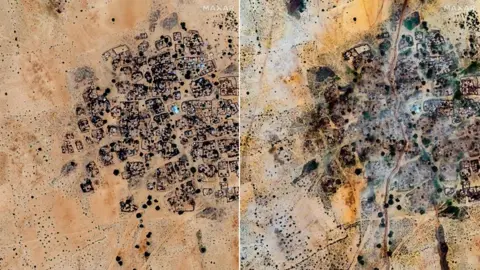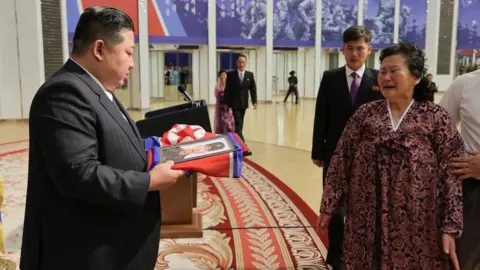In a historic moment, a group of Kurdish fighters from the P.K.K. burned their weapons in a public ceremony aimed at symbolizing their commitment to ending decades of armed struggle against the Turkish state. The ceremony took place in the mountainous region of northeastern Iraq and follows a broader peace process that had been initiated the previous year. This disarmament is the first tangible sign in that dialogue.
Visuals from the ceremony featured men and women in military attire standing before an image of Abdullah Ocalan, the group's longstanding leader currently imprisoned, who announced the cessation of armed conflict in a video released earlier. The event was characterized by the fighters' statements that they were relinquishing their arms voluntarily in favor of pursuing their agenda through political means rather than violence.
Turkey’s government welcomed the ceremony, citing it as a crucial movement towards concluding the P.K.K.’s violent legacy. Formed in the 1980s with the goal of establishing an autonomous Kurdish state, the P.K.K. has since been viewed as a terrorist organization by Turkey, the U.S., and the European Union, following extensive conflict that has caused numerous civilian casualties.
If successful, this peace initiative would represent a significant victory for Turkish President Recep Tayyip Erdogan, who has positioned himself as a driving force in addressing the country’s domestic security issues stemming from the P.K.K.'s insurgency. In comments to the media, Erdogan expressed optimism that the disarmament could lead to an era characterized by security and socio-economic development in Turkey.
The ceremony was attended by officials from both Iraqi and Turkish governments, including representatives from Turkish pro-Kurdish parties, indicating a collaborative effort to navigate the path toward a peaceful resolution.
Potential implications of this development extend beyond the regional dynamics, as a genuine shift towards political dialogue could redefine long-standing narratives around Kurdish rights, ethnic tensions, and national security in Turkey, paving the way for a more stable and integrated future in the region.
Visuals from the ceremony featured men and women in military attire standing before an image of Abdullah Ocalan, the group's longstanding leader currently imprisoned, who announced the cessation of armed conflict in a video released earlier. The event was characterized by the fighters' statements that they were relinquishing their arms voluntarily in favor of pursuing their agenda through political means rather than violence.
Turkey’s government welcomed the ceremony, citing it as a crucial movement towards concluding the P.K.K.’s violent legacy. Formed in the 1980s with the goal of establishing an autonomous Kurdish state, the P.K.K. has since been viewed as a terrorist organization by Turkey, the U.S., and the European Union, following extensive conflict that has caused numerous civilian casualties.
If successful, this peace initiative would represent a significant victory for Turkish President Recep Tayyip Erdogan, who has positioned himself as a driving force in addressing the country’s domestic security issues stemming from the P.K.K.'s insurgency. In comments to the media, Erdogan expressed optimism that the disarmament could lead to an era characterized by security and socio-economic development in Turkey.
The ceremony was attended by officials from both Iraqi and Turkish governments, including representatives from Turkish pro-Kurdish parties, indicating a collaborative effort to navigate the path toward a peaceful resolution.
Potential implications of this development extend beyond the regional dynamics, as a genuine shift towards political dialogue could redefine long-standing narratives around Kurdish rights, ethnic tensions, and national security in Turkey, paving the way for a more stable and integrated future in the region.



















